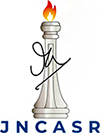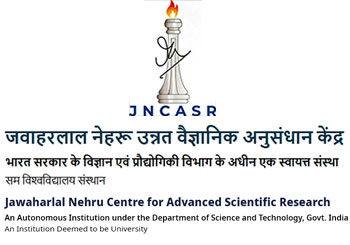TSU COLLOQUIUM
TSU COLLOQUIUM
Speaker: Dr. Sayantika Bhowal
Affiliation: Materials Theory, ETH Zurich, Wolfgang-Pauli-Strasse 27, 8093 Zurich, Switzerland
Title: Emergent Phenomena in Solids and How Multipoles Help in Understanding Them
Date and Time: 11th January 2023 (Wednesday) at 02:30 PM (Tea: 02:15 PM)
Place: Nevill Mott Hall, JNCASR
Abstract:
[PDF enclosed]
Understanding and foreseeing novel features of crystalline solids are of immense interest for their advanced functional usage. From a theoretical perspective, predicting material properties is a difficult task, and we only occasionally stumble across or discover new physical properties. In this presentation, I will discuss the "multipole analysis" approach that offers a systematic and potent way to accelerate the search for emerging phenomena in solids.
Multipoles have been extensively used in numerous branches of physics, widely ranging from nuclear and particle physics to classical electromagnetism. In condensed matter systems, they allow the characterization of the charge, spin, and orbital magnetic moments of electrons within a unified picture. Multipoles enable understanding as well as prediction of material properties that result from complex distributions of charge and magnetization density by providing a quantitative measure of such distributions.
To illustrate the utility of multipoles, I will focus on magnetoelectric multipoles [1], that exist both in real and momentum space. I will show how they are useful in characterizing both real-space magnetic skyrmion-like spin textures [2] as well as momentum-space spin textures [3], that result from e.g., Rashba-like interaction. Notably, such real- and momentum-space spin textures are key ingredients in designing spintronic devices. In this context, I will further discuss the emerging field of orbitronics [4,5], an alternative to spintronics, which relies on the orbital magnetic moment distribution rather than the spin-magnetic moment distribution in reciprocal space.
References:
- [1] S. Bhowal and N. A. Spaldin, Phys. Rev. Research 3, 033185 (2021).
- [2] S. Bhowal and N. A. Spaldin, Phys. Rev. Lett. (Editors' suggestion) 128, 227204 (2022).
- [3] S. Bhowal, S. P. Collins, and N. A. Spaldin, Phys. Rev. Lett. 128, 116402 (2022).
- [4] S. Bhowal and S. Satpathy, Phys. Rev. B (Rapid Comm.) 101, 121112 (2020).
- [5] S. Bhowal and G. Vignale, Phys. Rev. B (Editors' suggestion) 103, 195309 (2021).
Host: Prof. Subir Das
All are cordially invited.
- Back to previous page
- |
-
Page last updated date:11-03-2025 06:02 PM























